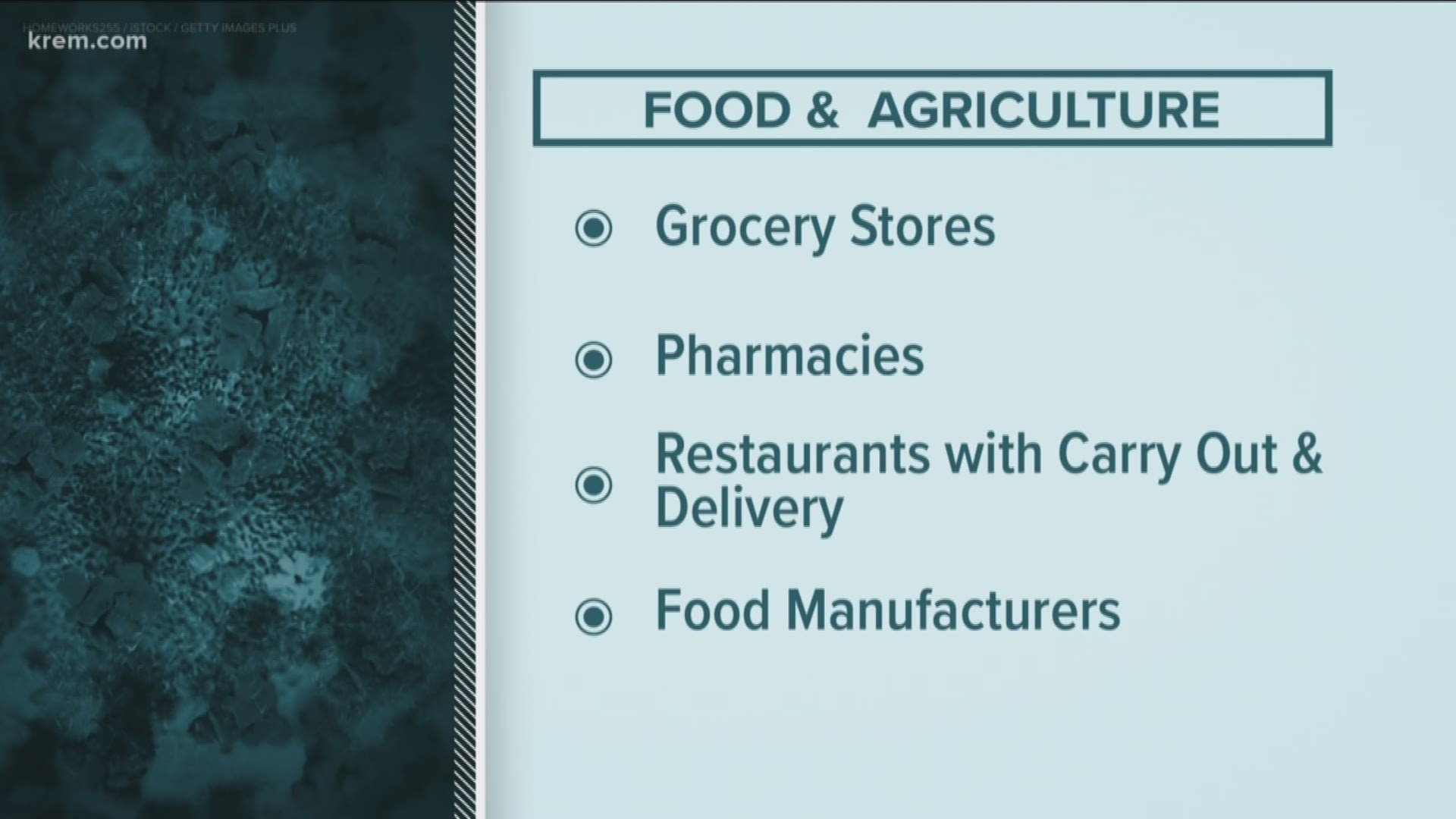SPOKANE, Wash. — Washington Gov. Jay Inslee issued a "stay-at-home" order in the state's effort to curb the outbreak of the 2019 novel coronavirus (COVID-19).
The order allows only "essential businesses" to remain open to the public.
What is an essential business? The state classifies grocery stores, pharmacies, doctors offices, to-go restaurants, gas stations, childcare and many more to be "essential."
This also includes liquor stores and marijuana dispensaries.
The state's list of "essential critical infrastructure workers” specifically points to workers supporting groceries, pharmacies, and other retailers that sell food and beverages. This includes corner stores and convenience stores, and liquor stores that sell food.
Workers in medical facilities also made the list — and that includes cannabis retailers, according to the list.
Many other sectors, including utilities, agriculture and communications, are also included on the list of essential businesses.
Workplaces that can operate remotely can continue to do so, Inslee said during his address to the public on Monday.
Washington's "stay-at-home" order for businesses starts 48 hours after Inslee signed the order on Monday. It started for residents immediately after the order was signed.
The following list contains just a few businesses and workers that the state has classified as "essential."
Health care
Includes hospitals, healthcare facilities, research centers, suppliers, medical supply manufacturers.
- Health care practitioners, including doctors, nurses, medical assistants, dentists, infection control, pharmacists, alternative therapists, midwives, and more.
- Hospital and laboratory personnel, including administrative workers.
- Workers in other medical facilities, including blood banks, mental health, and cannabis retailers.
- Those who provide direct services such as family care providers and those who work in homeless shelters.
- Mortuary employees.
- Workers at veterinary clinics.
Emergency Services
Includes police departments and fire stations, county sheriff’s offices, Department of Defense police and fire departments, public works departments, and private security firms.
- Firefighters, police officers, private security personnel.
- 911 dispatchers.
- Workers who maintain bridges, sewers, water, and other maintenance.
- Plumbers, electricians, exterminators, and others in the private sector who help homeowners and property owners maintain and repair their homes.
Food and Agriculture
Includes industries in the production, processing, and delivery of food.
- Grocery stores, pharmacies, convenience stores, farmers markets, food banks, liquor stores that sell food, supermarkets, and big box stores.
- Restaurants that offer carry-out or delivery.
- Food manufacturers and processors, including those in the beverage industry and shellfish industry.
- Farm workers and companies that support agriculture.
- Forest products workers, including lumber and paper.
- Cannabis stores.
Energy and Water
Includes those in electricity, oil, and natural gas industries.
- Workers who maintain, ensure, or restore the generation, transmission, and distribution of electric power, including call centers and utility workers.
- Gas stations and truck stops.
- Petroleum manufacturers.
- Water and wastewater facilities can remain open.
Transportation and Logistics
Includes aviation, public transit, highways freight and postal.
- Postal and shipping workers.
- Mass transit and ferry workers.
- Automotive, motorcycle, bicycle and motorized wheelchair/scooter repair and maintenance facilities.
- Truck drivers.
- Air transportation employees, including air traffic controllers, ramp personnel, aviation security, and aviation management.
Communications and Information Technology
Includes telephone, information technology, and media.
- Workers who support internet, telephone, cable and other communications services.
- Workers who support radio, television, newspapers and media services, including reporters, studio workers, technicians, and also workers involved in the printing and distribution of newspapers.
- Workers involved in communications service repair and restoration.
- Workers responding to cyber incidents involving critical infrastructure.
- Support required for continuity of services, including janitorial/cleaning personnel.
Community-based Government Operations
- Critical government workers, including the Governor’s Office.
- State and county workers responsible for determining eligibility for safety-net benefits.
- Elections personnel.
- Public and private childcare establishments, licensed pre-K establishments, and school district workers who facilitate distance learning, school meals or child care for essential workers.
- Laundromats and laundry services.
This is not a complete list of workplaces that will be allowed to operate during the stay-at-home order. The full list is available from the state's website.

